The Reader
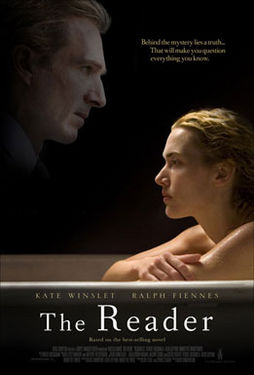
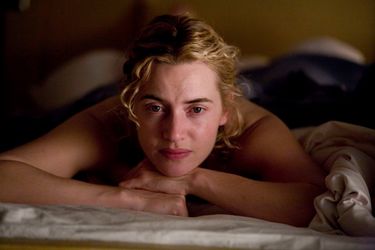 Is it because this is the fourth movie I've seen in about three months that dealt with the Holocaust? I know that Hollywood loves to tap into World War II stories during the "award season", but after The Boy in the Striped Pajamas, Valkyrie, Defiance and now this, I'm feeling a little tapped out. To be fair, the movie is not set during the Holocaust like those other films. It's set about a decade later, and deals with the emotions that came afterward. The story opens in the late 1950s, and a teenage boy named Michael Berg (David Kross) is struggling to make it home from school as a serious illness overtakes him right there on the street. Winslet's character is the Good Samaritan who looks after him during his walk home. She's Hanna Schmitz, a no-nonsense woman in her mid thirties who lives alone. When Michael recovers, he returns to her place to thank her for her kindness. An attraction builds quickly between the two, and before long, they're making love. Another part of their relationship is that Michael reads to her from classic books. We sense early on that Hanna herself is illiterate. When they go to a restaurant during one of their dates, she glances nervously at the menu, almost in tears, then tells him to order for her. The private affair carries on during the course of the summer, until one day Hannah disappears without a trace or a word.
Is it because this is the fourth movie I've seen in about three months that dealt with the Holocaust? I know that Hollywood loves to tap into World War II stories during the "award season", but after The Boy in the Striped Pajamas, Valkyrie, Defiance and now this, I'm feeling a little tapped out. To be fair, the movie is not set during the Holocaust like those other films. It's set about a decade later, and deals with the emotions that came afterward. The story opens in the late 1950s, and a teenage boy named Michael Berg (David Kross) is struggling to make it home from school as a serious illness overtakes him right there on the street. Winslet's character is the Good Samaritan who looks after him during his walk home. She's Hanna Schmitz, a no-nonsense woman in her mid thirties who lives alone. When Michael recovers, he returns to her place to thank her for her kindness. An attraction builds quickly between the two, and before long, they're making love. Another part of their relationship is that Michael reads to her from classic books. We sense early on that Hanna herself is illiterate. When they go to a restaurant during one of their dates, she glances nervously at the menu, almost in tears, then tells him to order for her. The private affair carries on during the course of the summer, until one day Hannah disappears without a trace or a word.Michael moves on with his life, going to law school, and it's through here that Michael once again encounters Hannah. He attends a War Crimes trial with his class, where some female Nazi concentration camp guards are on trial for their actions. To his shock, Hannah is one of the women being sent before the court. He's forced to watch silently as she talks of her unspeakable past, and is given the majority of the blame, since the other women on trial turn against her and convince the court that she was the one mainly responsible. Michael is afraid to speak up, half out of fear, and half out of respect for her. He knows she couldn't have written the report that the court is using as its main piece of evidence against her, but she is ashamed to admit she cannot read, so she takes the full punishment. The trial continues to haunt Michael's memories well into adulthood, where he's now played by Ralph Fiennes.
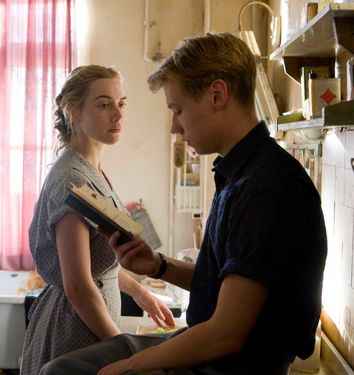 Winslet's performance is not only the best thing about The Reader, but her character is also the most fascinating and challenging. Hanna Schmitz is a complex character, worthy of discussion and thought long after the movie is over. Is it odd that she seems to be more ashamed over the fact she can't read or write than the fact she caused the deaths of innocent people? Her years working at the camp was merely a job for her. She was an uneducated woman, and she needed the opportunity. Michael tries to understand her actions, even well into middle age, but he doesn't get any closure. The movie doesn't give us any, either. These are the moments when the film is at its best. When it's asking tough questions about moral responsibility, The Reader is engaging. Hannah's main crime is revolved around an incident involving a church fire that claimed the lives of hundreds of people who were under her watch that night. When asked why she didn't unlock the door and let the people out, she coldly replies "there would be chaos". It was her job to keep the people in order. Hearing the story of what happened that night also gives special poignancy to a scene earlier in the film when Hannah steps inside a church to hear a children's choir singing, and begins to tear up.
Winslet's performance is not only the best thing about The Reader, but her character is also the most fascinating and challenging. Hanna Schmitz is a complex character, worthy of discussion and thought long after the movie is over. Is it odd that she seems to be more ashamed over the fact she can't read or write than the fact she caused the deaths of innocent people? Her years working at the camp was merely a job for her. She was an uneducated woman, and she needed the opportunity. Michael tries to understand her actions, even well into middle age, but he doesn't get any closure. The movie doesn't give us any, either. These are the moments when the film is at its best. When it's asking tough questions about moral responsibility, The Reader is engaging. Hannah's main crime is revolved around an incident involving a church fire that claimed the lives of hundreds of people who were under her watch that night. When asked why she didn't unlock the door and let the people out, she coldly replies "there would be chaos". It was her job to keep the people in order. Hearing the story of what happened that night also gives special poignancy to a scene earlier in the film when Hannah steps inside a church to hear a children's choir singing, and begins to tear up.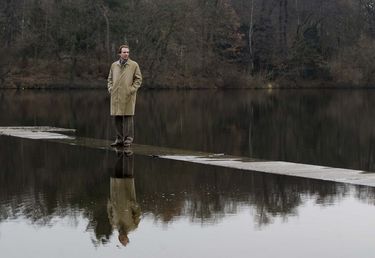 If the story had been about Hannah and told from her point of view, I have no doubt you would be reading about a very powerful and thought-provoking film. Unfortunately, this is Michael's story, and he just is not very interesting. Not as a teenager, where he seems lacking in personality, and especially not as an older adult, where Ralph Fiennes does what he can with the role, but suffers mainly because the movie doesn't give him enough material. He gets one good scene where he speaks with a survivor of the concentration camps, and is forced to ask himself if he is making excuses for Hannah because of his personal connection with her. The rest of the time, his scenes are clumsily inserted throughout the central story, and never seems to go anywhere. As the younger Michael, David Kross has strong chemistry with Winslet, a good thing since many of their scenes are intimate and sexual. But once again, the dry character does the performance no favors.
If the story had been about Hannah and told from her point of view, I have no doubt you would be reading about a very powerful and thought-provoking film. Unfortunately, this is Michael's story, and he just is not very interesting. Not as a teenager, where he seems lacking in personality, and especially not as an older adult, where Ralph Fiennes does what he can with the role, but suffers mainly because the movie doesn't give him enough material. He gets one good scene where he speaks with a survivor of the concentration camps, and is forced to ask himself if he is making excuses for Hannah because of his personal connection with her. The rest of the time, his scenes are clumsily inserted throughout the central story, and never seems to go anywhere. As the younger Michael, David Kross has strong chemistry with Winslet, a good thing since many of their scenes are intimate and sexual. But once again, the dry character does the performance no favors.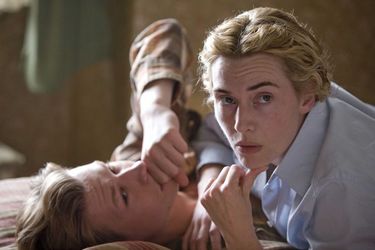 This causes an uneasy balance that the movie never recovers from. Sometimes The Reader is masterful and suspenseful, but most of the time, it's meandering and somewhat dull. Every time Kate Winslet is on the screen, the movie comes alive. I was grateful for these moments, but I wanted more. I wanted the story to captivate, and I wanted to become involved. The storytelling is too choppy to make us truly care. The film is based on a novel by Bernhard Schlink, and although I have never read the book, the script often sounds like screenwriter David Hare went through the book, picked out the major sequences, and cared little about lead-in between them. It's a "Greatest Hits" of moments. I was especially disappointed with the scenes that took place after the trial, which seem to kind of lose all sense of purpose, and just kind of drag themselves out for an extra 40 minutes or so until the movie is done.
This causes an uneasy balance that the movie never recovers from. Sometimes The Reader is masterful and suspenseful, but most of the time, it's meandering and somewhat dull. Every time Kate Winslet is on the screen, the movie comes alive. I was grateful for these moments, but I wanted more. I wanted the story to captivate, and I wanted to become involved. The storytelling is too choppy to make us truly care. The film is based on a novel by Bernhard Schlink, and although I have never read the book, the script often sounds like screenwriter David Hare went through the book, picked out the major sequences, and cared little about lead-in between them. It's a "Greatest Hits" of moments. I was especially disappointed with the scenes that took place after the trial, which seem to kind of lose all sense of purpose, and just kind of drag themselves out for an extra 40 minutes or so until the movie is done.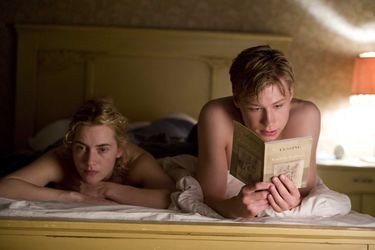
See the movie times in your area or buy the DVD at Amazon.com!






0 Comments:
Post a Comment
<< Home